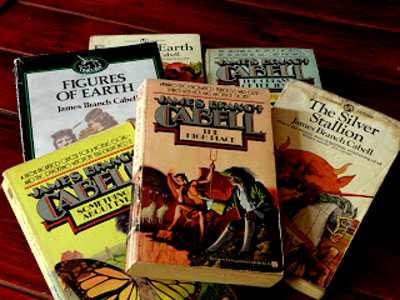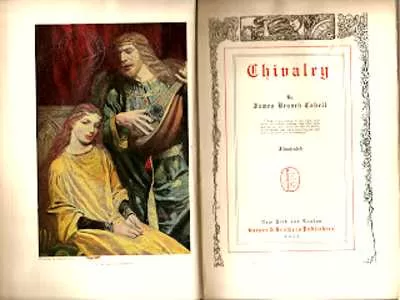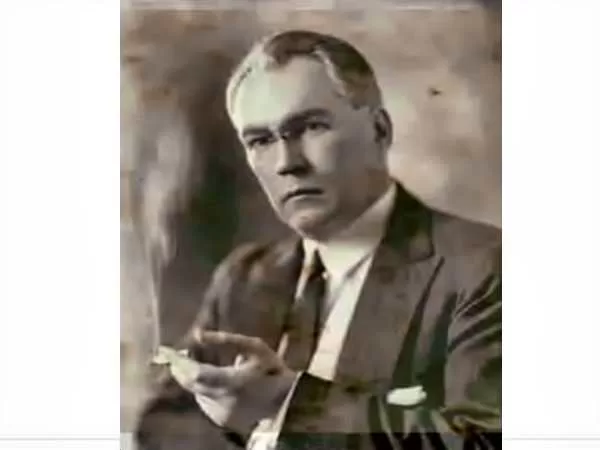“The optimist proclaims that we live in the best of all possible worlds; and the pessimist fears this is true.” This quote, reminiscent of Voltaire’s Candide, actually belongs to James Branch Cabell, a once-celebrated but now largely forgotten author.
Cabell, who enjoyed brief revivals in the 1970s and 1980s during the fantasy boom, wrote over fifty books, twenty of which share a common theme centered on the fictional medieval French province of Poictesme (pronounced pwa-tem). These interconnected tales chronicle the life of Count Manuel and his descendants, weaving a rich tapestry of allegory, satire, and wordplay.
My introduction to Cabell came through Jurgen, his most notorious work. The novel follows the adventures of Jurgen, a middle-aged pawnbroker who defends the Devil in court. As a reward, the god Koshchei, ruler of the universe, kidnaps Jurgen’s shrewish wife, Dame Lisa. Jurgen reluctantly embarks on a quest to rescue her, traversing fantastical realms and encountering famous figures like Helen of Troy, Queen Guinevere, and even the Devil’s wife. Ultimately, he ends up in Heaven, where he’s offered any of the women he met during his journey but chooses Dame Lisa, lamenting that none of his adventures brought him what he truly desired.

Subtitled A Comedy of Justice, Jurgen was published in 1919 and thrust Cabell into the spotlight when the New York Society for the Suppression of Vice condemned it as “offensive, indecent, lewd, obscene, and lascivious.” The book became the subject of a two-year obscenity trial that ultimately ruled in Cabell’s favor, arguing that the so-called indecencies were merely innocent double entendres. Judge Charles Nott famously stated, “…it is doubtful if the book could be read or understood at all by more than a very limited number of readers.” Ironically, the scandal boosted Cabell’s fame, turning Jurgen into one of the most talked-about books of the 1920s. Demand surged as young readers sought out copies, captivated by the controversy.
I stumbled upon Jurgen unaware of its controversial past, finding it neither obscene nor vulgar but rather a clever allegory filled with wit and philosophical musings. Although he was admired by contemporaries like Mark Twain, H.L. Mencken, Sinclair Lewis, and F. Scott Fitzgerald, Cabell’s popularity waned as more realistic writers, such as Hemingway, rose to prominence. Critics dismissed his later works as either too similar to Jurgen or not enough like it.

Nevertheless, I was hooked. I scoured second-hand bookstores, eBay, and internet marketplaces for more of Cabell’s works, collecting everything from reprinted paperbacks to rare editions from the 1920s and 1930s. Among my prized possessions is a first edition of Chivalry (1909), once housed in Leeds City Library. I also own multiple versions of Jurgen, including a Dover reprint with illustrations by F.C. Papé. Some titles, like the whimsically named The Rivet in Grandfather’s Neck, still elude me—though I managed to find a PDF scan.
One of the joys of reading Cabell lies in decoding his playful language. His works are littered with puns, anagrams, and hidden meanings. In Jurgen, the titular character meets worshippers of a triple goddess named Ageus, Sesphra, and Vel-Tyno—clever rearrangements of “Usage,” “Phrases,” and “Novelty.” In Something About Eve, the hero Gerald Musgrave journeys through lands with cryptic names like Doonham, Dersam, and Lytreia, which challenge the reader to unravel their hidden significance. Even place names like Storisende (“story’s end”) are subtle nods to the reader’s journey through his narrative.

Cabell also embedded “prose poems” within his texts—short, structured passages that read like verse. In The Cream of the Jest, he introduces the magical Sigil of Scoteia, a broken talisman revealed to be nothing more than the metal lid of a cold cream jar. Such absurd twists showcase Cabell’s flair for blending the mundane with the fantastical.
Despite Cabell’s current obscurity, his work continues to influence. Jurgen inspired Flann O’Brien, one of Cabell’s admirers, to write his novel At Swim-Two-Birds. Cabell’s exploration of the human quest for beauty and meaning resonates today, offering readers a rich, layered experience often absent in modern fantasy.
James Branch Cabell’s novels are more than mere fantasy; they are windows into a world where wit and wordplay meet profound philosophical insights. His characters’ quests mirror our own—navigating life’s absurdities, grappling with desire, and seeking a place in a world that is both marvelous and flawed. In rediscovering Cabell, we are reminded that the search for beauty and meaning is timeless, much like the literary magic that defines his forgotten but unforgettable work.

